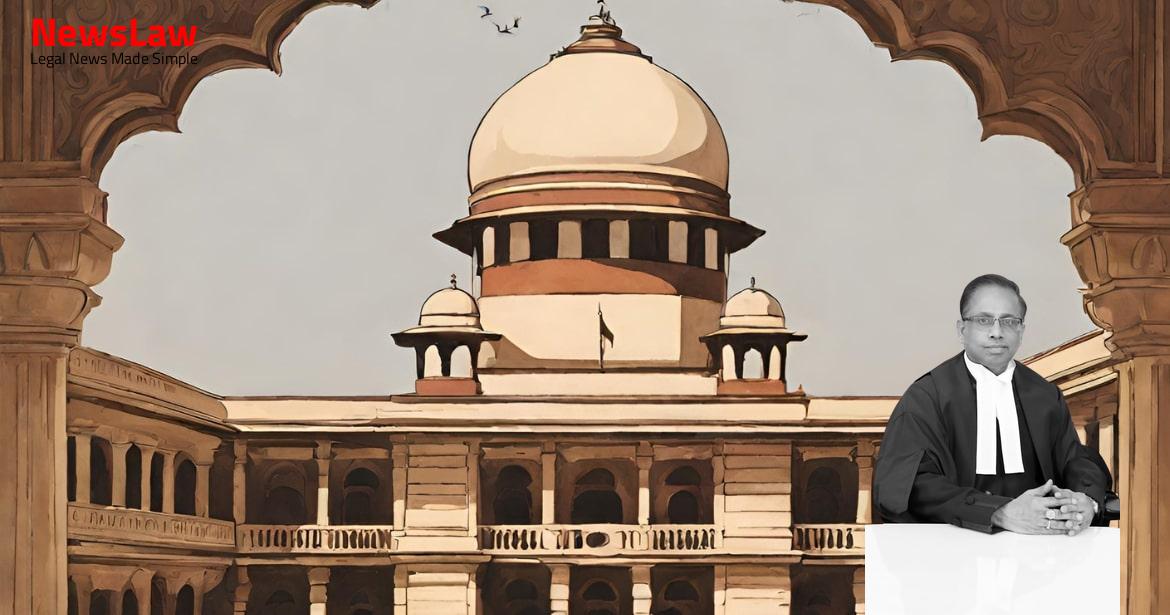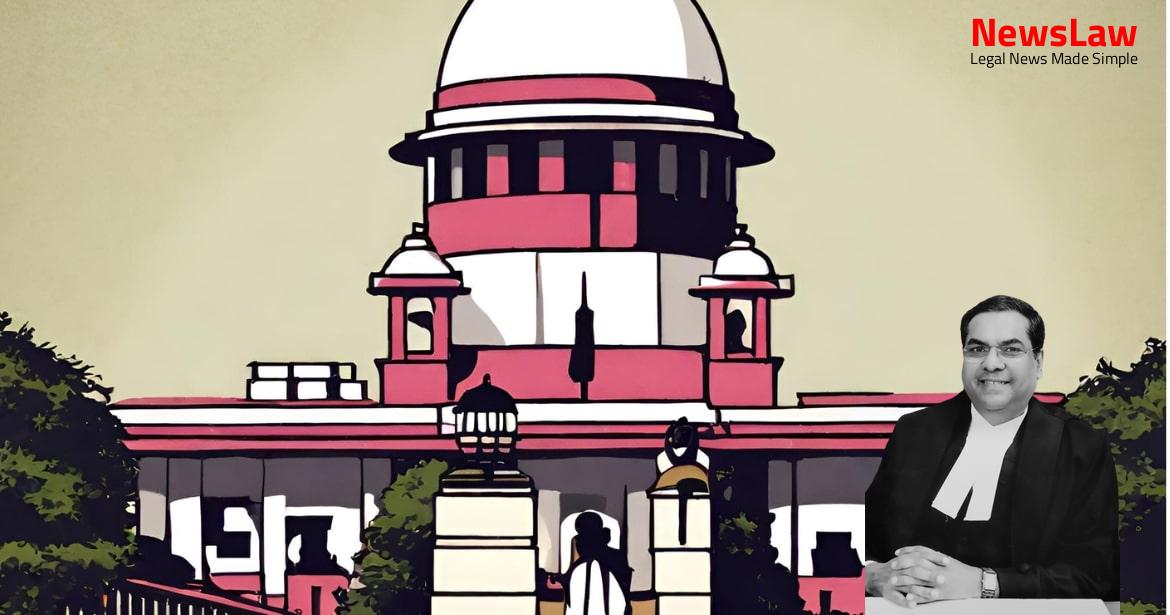Explore the case of confirmation dispute between Tripura University and Dr. Praveen Kumar Mishra, where the Supreme Court rendered a crucial judgment. Discover how the court’s decision unfolded and its implications in ensuring justice and fairness in such matters.
Facts
- The Appellant joined the University on 17.01.2016 against a lien vacancy, which was later extended.
- An offer of appointment to the Appellant for an Unreserved lien vacancy was made on 07.12.2016.
- Dr. Praveen Kumar Mishra, who held the lien, resigned from the post on 18.09.2017.
- The Executive Council accepted Dr. Praveen Kumar Mishra’s resignation on 14.11.2017, creating a vacancy.
- The Appellant expected regularization based on the original appointment advertisement.
- The Executive Council did not confirm the Appellant’s services on 13.12.2018 and decided to re-advertise the post.
- The Appellant was informed on 06.02.2019 that her service against the lien would expire and was asked to apply as a Guest Faculty if interested.
- The Appellant sought reasons for discontinuance but received no response from the University.
- The Appellant’s representation for continuation and response to prior letters were left unanswered by the University.
- The re-advertisement of the post was mentioned in the Resolution of the 32nd Executive Council Meeting on 13.12.2018.
- The issue of regularizing or re-advertising the post was in the larger interest of candidates who had not applied due to the post being under lien.
- No adverse information about the appellant was mentioned in the counter.
- A learned Single Judge rejected the contentions of the Appellant and dismissed the writ petition.
- The Tripura University’s stand was found faultless by the Single Judge.
- The Division Bench of the High Court affirmed the Single Judge’s order and dismissed the appeal.
- On 27.11.2015, the Executive Council of the University granted a lien to Dr. Praveen Kumar Mishra allowing him to join a post at Sikkim University.
- The Division Bench confirmed the Single Judge’s judgment dismissing the writ petition of the Appellant.
Also Read: Supreme Court Judgement on SEBI’s Consent Order in Writ Petition
Issue
- Issue of whether the Respondent-University was justified in not confirming the Appellant and deciding to readvertise the post
- Consideration of whether this decision was valid as per the details provided in the meeting agenda
- Questioning the justification behind the resolution made on 13.12.2018
- Exploring the potential relief that may be due to the Appellant if the decision was not justified
Also Read: Das v. Das: Custody Rights Upheld by Supreme Court
Arguments
- Learned counsel argues that the assumption that all eligible candidates would not have applied due to the vacancy being a lien vacancy was erroneous.
- The Appellant was entitled to be considered for both the regular and lien vacancies until the final selection.
- Reference is made to Clause 19 in the employment notice, Minutes of the Executive Council meeting, and the offer of appointment to support the Appellant’s confirmation.
- Counsel cites judgments in Somesh Thapliyal vs Vice Chancellor, H.N.B. Garhwal University and Meher Fatima Hussain vs Jamia Milia Islamia in support of their submissions.
- The decision of the Executive Council to re-advertise the post once it became permanently vacant is considered reasonable.
- The Appellant filed a Writ Appeal before the Division Bench of the High Court, challenging the decision not to confirm her and to re-advertise the post.
- It is argued that the nature of the advertisement was misunderstood by the courts below, as it advertised for two positions in law – one regular and one lien vacancy.
- Mr. Sujeet Kumar supported the findings of the courts below
- He contended that there was no scope for interference with the same
Analysis
- The University’s decision to deny confirmation to the Appellant after clearing all contingencies and vacating the lien was unjust and arbitrary.
- The offer of appointment clearly indicated that in case of lien vacation, the Appellant’s service would continue with Executive Council approval.
- The University’s action of not continuing the incumbents and starting a fresh selection process was deemed to be violative of Article 14.
- The Appellant went through a regular selection process for a single regular vacancy, ensuring no prejudice to other candidates.
- The University’s reasoning for denying confirmation was found to be unfounded as all candidates competed for the regular vacancy.
- The Appellant had a legitimate expectation of continuance and regularization based on representations in employment notices and resolutions.
- Performance being satisfactory with no adverse remarks, there were no valid reasons provided by the University to deny confirmation.
- The discretion of the Executive Council should be exercised fairly and non-arbitrarily, and no public interest grounds were established for the denial.
- The High Court’s decision favoring the University’s discretion was considered unfair and arbitrary.
- The absence of valid reasons in the Executive Council meetings and letters further highlighted the unjust denial of confirmation.
- Given the sanctioned teaching posts and compliance with UGC norms, the Appellants were deemed to be rightfully appointed against sanctioned posts.
- The fair and just exercise of power would require the confirmation of the Appellant against the vacancy due to the absence of unsatisfactory performance.
- Precedents were cited where incumbent qualifications and regular selection processes justified continuance instead of fresh selections.
- The condition of Executive Council approval cannot be arbitrarily exercised, and a fair approach is warranted.
- The doctrine of legitimate expectation in public law is based on fairness and non-arbitrariness.
- Public authorities should honor their promises or past practices while performing public duties.
- The legitimate expectation doctrine entitles the holder to an explanation if the expected benefit is denied.
- Public authorities have a duty to use their powers for the public good, creating a legitimate expectation for citizens to be treated fairly and non-arbitrarily.
- The doctrine recognizes that a public authority’s promise or past conduct can give rise to a legitimate expectation.
- The appellant is entitled to an acceptable explanation for the denial of the expectation as per Ram Pravesh Singh and Sivanandan C.T.
- The legitimate expectation was not outweighed by any overriding public interest in this case.
- The appellant should succeed based on this additional ground.
- No prejudice to public interest could have been caused as eligible candidates would have applied for the regular slot regardless.
Decision
- Appellant’s case to be placed for confirmation before the Executive Council
- Executive Council and University to pass appropriate resolution/order within four weeks
- Resolution in Agenda No.18/32/2018 of the Executive Council meeting on 13.12.2018 set aside
- Letter from the Registrar dated 06.02.2019, regarding termination, set aside
- Appellant to be granted all consequential benefits
- No order as to costs in this judgement
- Appeal allowed, setting aside the judgments of the Single Judge and Division Bench
Case Title: MAITREYEE CHAKRABORTY Vs. THE TRIPURA UNIVERSITY (2024 INSC 616)
Case Number: C.A. No.-009730-009730 – 2024



